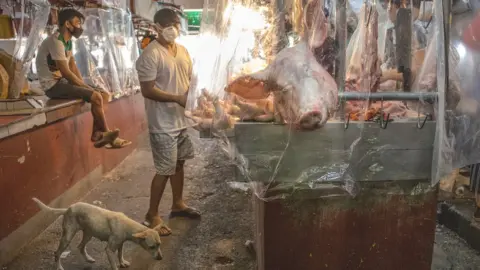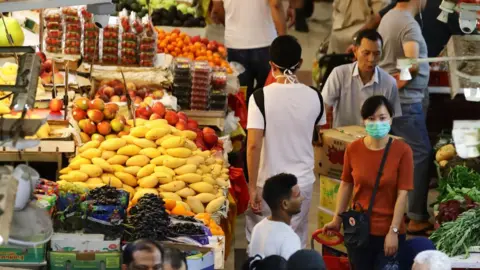Coronavirus: WHO developing guidance on wet markets
 Getty Images
Getty ImagesThe World Health Organization (WHO) is calling for stricter safety and hygiene standards when wet markets reopen.
And it says governments must rigorously enforce bans on the sale and trade of wildlife for food.
The start of the pandemic was linked to a market in Wuhan, where wildlife was on sale.
Wet markets are common in Asia, Africa and elsewhere, selling fresh fruit and vegetables, poultry, fresh meat, live animals and sometimes wildlife.
The WHO is working with UN bodies to develop guidance on the safe operation of wet markets, which it says are an important source of affordable food and a livelihood for millions of people all over the world.
But in many places, they have been poorly regulated and poorly maintained, Dr Tedros Adhanom Ghebreyesus, director general of the WHO, said in a briefing on Friday.
"WHO's position is that when these markets are allowed to reopen it should only be on the condition that they conform to stringent food safety and hygiene standards," he said. "Governments must rigorously enforce bans on the sale and trade of wildlife for food."
And he added: "Because an estimated 70% of all new viruses come from animals, we also work together closely [with the World Organization for Animal Health and the Food and Agricultural Organization, FAO, of the United Nations] to understand and prevent pathogens crossing from animals to humans."
Public health concerns
The pandemic has led to some wildlife conservation organisations calling for blanket bans on the wildlife trade on public health grounds, including bans on the commercial trade in wildlife for human consumption and closing down live wildlife markets.
Dr Mark Jones, head of policy at Born Free, urged the WHO to work alongside governments to ban wildlife markets and bring an end to the commercial wildlife trade, including measures to protect wildlife habitats.
He said this was necessary "to halt and reverse the devastating declines in the natural world that have brought a million species to the brink of extinction and threaten the future of wildlife and humanity alike".
However, other experts have warned against an outright ban on markets and wildlife trade, saying this could prove counterproductive.
 Getty Images
Getty ImagesWriting in The Conversation, Dan Challender and Amy Hinsley from the University of Oxford, said banning all wildlife trade "is a knee-jerk and potentially self-defeating measure".
"A more appropriate response would be improving regulation of wildlife markets, especially those involving live animals. This should include full consideration of public health and animal welfare concerns to ensure there is low risk of future animal-to-human disease outbreaks."
What are wet markets?
Wet markets are a familiar sight in many countries. Selling live fish, chickens and wildlife, as well as fresh fruit and vegetables, they get their name from the melting of ice used to preserve goods, as well as to wash the floors clean of blood from butchered animals.
Why are they linked to the spread of disease?
Many experts think Covid-19 likely originated in the Huanan Seafood Wholesale Market in Wuhan, which has been linked to early confirmed cases. While not a wet market in the strictest sense, reports suggest the market was selling wildlife, including snakes, porcupine and deer.
After an initial cluster of cases connected to the market, the virus began spreading dramatically inside China, before reaching much of the world. The origins of the novel virus are unknown, but it most likely emerged in a bat, then made the leap to humans via another wild animal host.
Wet markets can be "timebombs" for epidemics, says Prof Andrew Cunningham, deputy director of science at the Zoological Society of London (ZSL). "This sort of way that we treat... animals as if they're just our commodities for us to plunder - it comes back to bite us and it's no surprise."
Follow Helen on Twitter.
